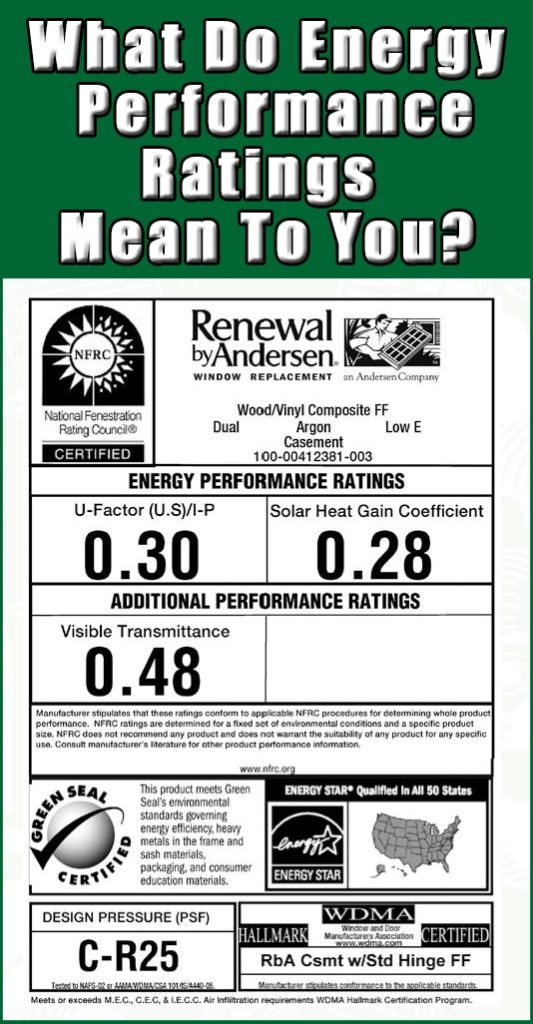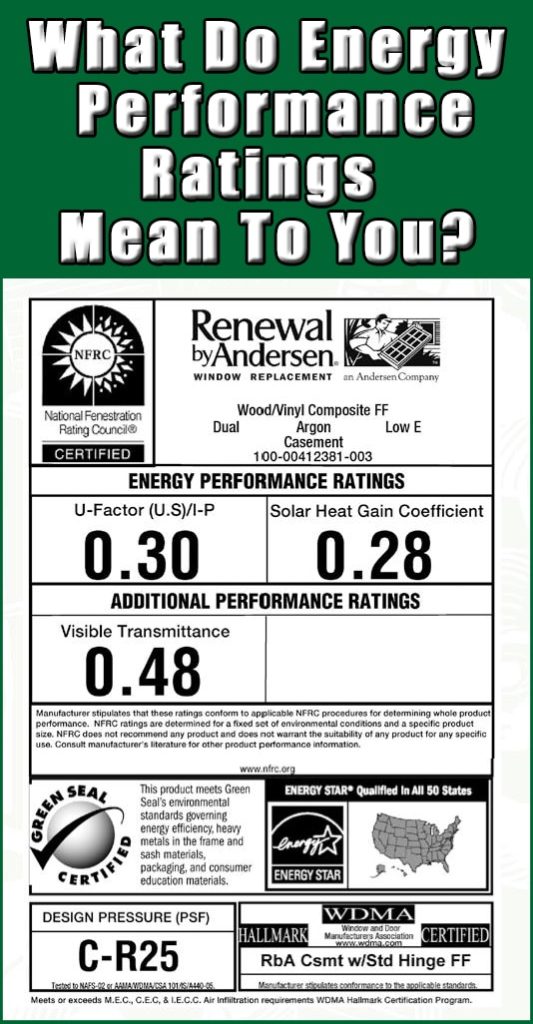MENU



Naturally, we hope you choose to allow us to build, install and warranty your new windows, but we recognize that will not always be the case. We also realize there is a lot of hype out there and it’s our responsibility to help clarify some of the confusion or misleading information.
One of the ways that we help homeowners compare products is to provide fact-based efficiency ratings. Of course, those numbers won’t help you recognize the “hype” unless you understand what they mean and “who” sets the standards, so we created this post to help explain some of the NFRC, sometimes called the ENERGY STAR, label information and what this means to you and the performance of your windows.
The National Fenestration Rating Council (NFRC) sets the standards and procedures for testing products. Before a replacement window company applies the ENERGY STAR label, independent labs approved by the NFRC must test performance. The tests determine how well a window manages:
It is important to interpret the ratings properly when comparing home improvement products. And, you must realize that the ratings reflect performance under controlled conditions. Every home is unique and other factors, such as the installation quality and the overall structural integrity of your New Jersey or New York home, may affect how well each product performs for you
Here are the basics about some of the most important ratings and how to interpret them.
U-Factor Versus R-Factor Ratings
U-Factor ratings (or U Value) represent how well a product is able to keep heat inside your home. The lower the rating, typically between .015 and 1.20, the more efficient the window or door is at controlling heat loss. U-Factor ratings are especially important during cold winter months. Some consumers get confused about R-Factor and U-Factor ratings. The primary difference is that U-Factor numbers measure the amount of heat loss while the R-Factor represents the resistance and conductance. U-Factor ratings are affected by more than just how quickly a window pane heats up (conductance). For example, airflow around the window and the amount of heat that is reflected are two additional considerations in the U-Factor formula.
Solar Heat Gain Coefficient (SHGC)
The Solar Heat Gain Coefficient (SHGC) number represents how much heat from the sun is blocked from entering your home. Ratings range from 0 to 1. The closer the rating is to zero, the more efficient a replacement window is at blocking solar heat gain. New Jersey and New York Metro residents have longer, colder winters than the deep South, but our summers can get pretty hot and humid too, so we look for a window that will allow homeowners to maximize heat loss during the cold winter and effectively block heat during the hot summer months. Whether you’re planning to install large bay windows or easy clean tilt-in double-hung windows, our consultants can help you determine which of our glass options are best for each room in your home depending upon its directional orientation and shading characteristics.
We may recommend that you choose a different glass type for windows that are heavily shaded than for windows that are exposed to full sun to help you manage your utility bills better throughout the seasons.
Visible Transmittance (VT)
The Visible Transmittance (VT) rating represents the visible light that comes through your replacement windows. Like the SHGC, ratings range from zero to one. A high number means natural light levels are generally higher. That means you have greater potential for using daylighting, but can also lead to glare inside your home. This is important to consider: you wouldn’t want to have to wear sunglasses inside, would you?
Air Leakage
Air leakage ratings reflect how much air flows through the window, either entering or leaving your home. Air leakage ratings are optional, but it makes sense that any air leakage results in lower efficiency and higher heating and air conditioning bills. That’s why Renewal by Andersen of Central New Jersey and New York Metro products all come standard with exceptional weather-stripping to maximize the potential to stop air leakage. And, our designs and construction materials are among the best in the industry at preventing leaks. For example, our Fibrex frames never sag or pull away from your home structure, two things that cause leaks, and we back up that claim with our exclusive owner-to-owner warranty. Ratings range from .10 to .30. The closer the number is to .10, the better the product controls leaks.
Condensation
Condensation Resistance ratings range from 1 to 100. Higher numbers demonstrate that the replacement window controls condensation better. Like the air leakage rating, condensation ratings are optional.
When comparing products, the ENERGY STAR label is a fantastic place to start. But, there is so much more that homeowners need to consider.
If you still have questions about all the numbers, we’re here to help. Call us today to schedule an in-home consultation. Our toll free number is (866) 609-5033. No time to call now? No problem, just fill in the short form on this page to request more information about ENERGY STAR ratings and Renewal by Andersen of New Jersey replacement windows and patio doors.